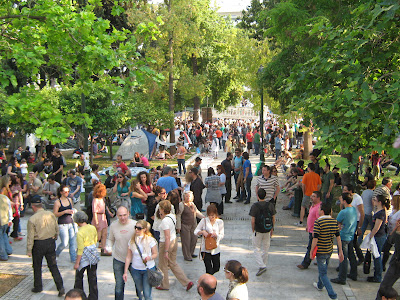“Being in Syntagma these days is like being at a festival! And that makes me feel uneasy.” My friends sentiment sums up a lot of what’s amasing, and also uncertain, about the Syntagma Square occupation, now in its sixth day.
Inspired- or perhaps egged on? – by recent occupations across Spain (rumours have it that a message from Spanish protesters about the inactivity of Greeks spurred on the creation of the campaign to occupy the square), the occupation of Syntagma Square (and now at an estimated 120 other sites across Greece) came about initially via a Facebook group calling for “Real Democracy Now!” The intentions that brought people together are broad: a general sense of anger that the social fabric of the country is being torn apart after a year of extremely harsh austerity measures, a complete lack of faith in politicians to make things any better, and a need for some drastic changes. The idea of real democracy offers a powerful image with a multitude of interpretations.
When the occupation begun last Wednesday it was interesting that the people I spoke to about it were dubious; An ‘I’ll go if you go’ kind of attitude. I felt the same. Lots of people remain dubious, but now many of those same people are becoming more interested in what’s going on there. They have more interest and faith in it. More people are offering help and are getting their tents out to join the increasingly established crowd. More people have invested something of themselves in the process.
The momentum is growing and things are getting more organised. Solid outcomes are still thin on the ground, but then reaching consensus with 150 000 people of all political stripes was never going to be easy. Syntagma remains a non-partisan space and there is collective agreement to keep it that way (all-out scuffles between protesters and those who have attempted to erect banners or distribute propaganda have occasionally broken out). There is a strong feeling that all the partisan politics of Greece has contributed to – rather than eased – the mess that the country is in.
The people facilitating its progression so far seem to be doing a good job at guiding people through a practical process of organising whilst also limiting the creep of political bias (one side effect of the momentous amount of protest among Greeks over the last 3 years, especially from the 2008 riots, is experience among many of how to practically organise).
 |
| Performers entertain the crowds at Syntagma |
The occupation is developing its own geography. The protesters who gather in front of the Parliament building itself make the most noise, but the feeling is that these are the less politicised and committed participants. On the right hand side you have the right wing supporters. Here you find the Greek flags (although most of these flags remain on the stalls of the people selling them, rather than in the hands of protesters). On the left hand side you have the left wing supporters. I guess this is a predictable split.
Moving into Syntagma Square itself, the space is a mishmash of tents, people and souvlaki stalls, all arranged around the street furniture of the squares fountains and cafes. Camps are divided into a barrio system, whereby each barrio fulfils a specific task for the occupation. Representatives from each barrio attend daily assemblies to feed back and contribute to the decision making. So far, the occupation is exhibiting the direct democracy they are ultimately calling for. There is a real sense of possibility at Syntagma; that something more lasting could be nurtured out of this collective anger. There is also awareness that what exists so far is fragile.
The support and success of Syntagma so far lies in its broad supporter base. But how do you make something specific and concrete out of something so broad? What can everybody participating agree on? It’s the age old dilemma of depth versus breadth.
The occupation has been praised for its diversity, particularly in terms of age and class. But the occupation is also incredibly white. Talking to a friend from Bangladesh who has lived in Athens for a year, he said he had no interest in Syntagma. Why would he? His experience of Greece has so far been one of unemployment and harassment. Why should he show interest in problems affecting Greeks? In that sense, there remain parts of the community – especially those who might consider themselves excluded from it, such as ‘illegal’ migrants and refugees – who don’t see an opportunity in Syntagma; that this thing doesn’t speak for them. Syntagma is diverse, but within certain boundaries, primarily of nationality and race.
As a (white) brit living in Athens, the occupation feels Greek. Indeed, it is an outcry of anger to some definitive Greek problems (regaining Greek sovereignty from the IMF, World Bank and EU, for example, or the specific nature of Greek clientalism and political corruption). But issues of debt and fraudulent democracy are issues that extend beyond Greece and are shared with the wave of occupations across Europe and North Africa. The occupation currently feels like it has enough nationalism in it to exclude those who don’t identify themselves as Greek and to limit its connection to these other sites of protest. There needs to be more space within the discourse of Syntagma for the global dimension of its crises, for Syntagma to link up with the other occupations across Europe and Africa and really embrace the global nature of these protests.



No comments:
Post a Comment